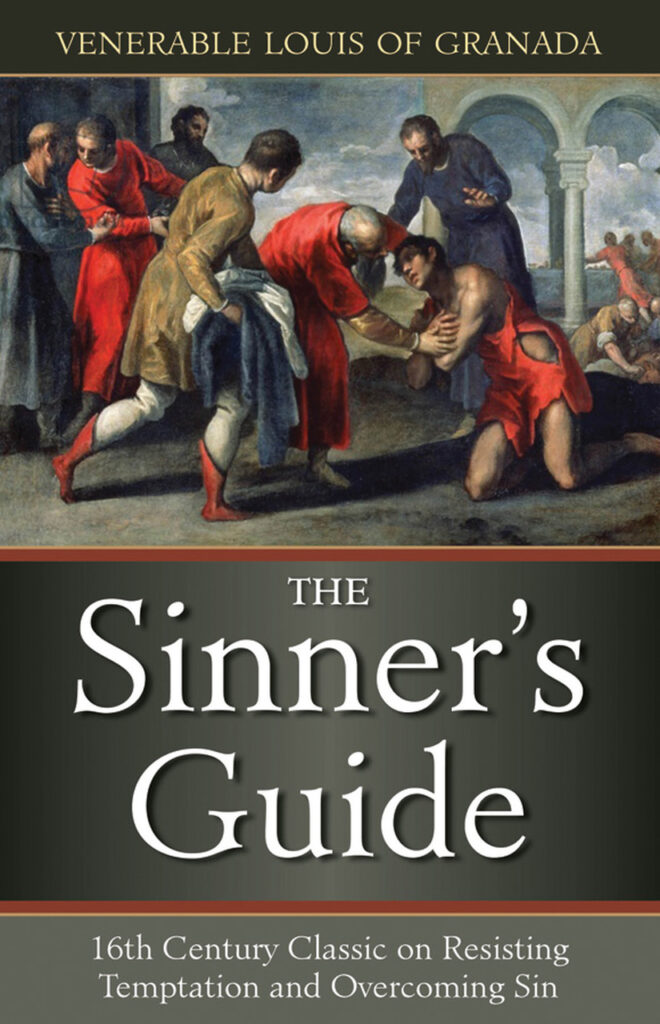Consider also the danger of vainglory, the daughter of pride, which St. Bernard says, enters lightly but wounds deeply. Therefore, when men praise you, think whether you really possess the qualities for which they commend you. If you do not, you have no reason to be proud. But if you have justly merited their praise, remember the gifts of God, and say with the Apostle, “By the grace of God I am what I am” (1 Cor. 15:10). Humble yourself, then, when you hear the song of praise, and refer all to the glory of God. Thus you will render yourself not unworthy of what He bestows upon you.
For it is incontestable that the respect men pay you, and the good for which they honor you, are due to God. You rob Him, therefore, of all the merit which you appropriate to yourself. Can any servant be more unfaithful than one who steals his master’s glory? Consider, moreover, how unreasonable it is to rate your merit by the inconstant opinion of men who today are for you, and tomorrow against you; who today honor you, and tomorrow revile you. If your merit rests upon so slight a foundation, at one time you will be great, at another base, and again nothing at all, according to the capricious variations of the minds of men.
Oh, no; do not rely upon the vain commendations of others, but upon what you really know of yourself. Though men extol you to the skies, listen to the warnings of your conscience and accept the testimony of this intimate friend rather than the blind opinion of those who can judge you only from a distance and by what they hear. Make no account of the judgments of men, but commit your glory to the care of God, whose wisdom will preserve it for you and whose fidelity will restore it to you in the sight of angels and men.
Be mindful also, O ambitious man, of the dangers to which you expose yourself by seeking to command others. How can you command when you have not yet learned to obey? How can you take upon yourself the care of others when you can hardly account for yourself? Consider what a risk you incur by adding to your own sins those of persons subject to your authority. Holy Scripture tells us that they who govern will be severely judged, and that the mighty shall be mightily tormented (Cf. Wisdom 6:6). Who can express the cares and troubles of one who is placed over many? We read of a certain king who, on the day of his coronation, took the crown in his hands, and, gazing upon it, exclaimed, “O crown richer in thorns than in happiness, did one truly know thee he would not stoop to pick thee up even if he found thee lying at his feet.”
Again, O proud men, I would ask you to remember that your pride is displeasing to all – to God, who resists the proud and gives His grace to the humble (cf. James 4:6); to the humble, who hold in horror all that savors of arrogance; and to the proud themselves, who naturally hate all who claim to be grater than they. Nor will you be pleasing to yourself. For if it ever be given to you in this world to enter into yourself and recognize the vanity and folly of your life, you will certainly be ashamed of your littleness. And if you do not correct it here, still less satisfaction will it afford you in the next world, where it will bring upon you eternal torments.
St. Bernard tells us that if we truly knew our hearts we would be displeasing to ourselves, which alone would make us pleasing to God; but because we do not know ourselves we are inflated with pride and therefore hateful in His sight. The time will come when we shall be odious to God and to ourselves – to God because of our crimes, and to ourselves because of the punishment they will bring upon us. Our pride pleases the devil only; for as it was pride which changed him from a pure and beautiful angel into a spirit of malice and deformity, he rejoices to find this evil reducing others to his unhappy state.
Another consideration which will help you acquire humility is the thought of the little you have done purely for God. How man’s vices assume the mask of virtue! How frequently vainglory spoils our best works! How many times actions which shine with dazzling splendor before men have no beauty before God! The judgments of God are different from those of men. A humble sinner is less displeasing in His sight than a proud just man, if one who is proud can be called just.
Nevertheless, though you have performed good works, do not forget your evil deeds, which probably far exceed your works of virtue, and which may be so full of faults and so negligently performed that you have more reason to ask to be forgiven for them than to hope for reward. Hence St. Gregory says:
“Alas for the most virtuous life, if God judge it without mercy, for those things upon which we rely most may be the cause of the greatest confusion to us. Our bad actions are purely evil, but our good actions are seldom entirely good, but are frequently mixed with much that is imperfect. Your works, therefore, ought to be a subject of fear rather than confidence, after the example of holy Job, who says, ‘I feared all my works, knowing that thou didst not spare the offender’” (Job 9:28).
Since humility comes from a knowledge of ourselves, pride necessarily springs from ignorance of ourselves. Whoever, therefore, seriously desires to acquire humility must earnestly labor to know himself. How, in fact, can he be otherwise than humbled who, looking into his heart with the light of truth, finds himself filled with sins; defiled with the stains of sinful pleasures; the sport of a thousand errors, fears, and caprices; the victim of innumerable anxieties and petty cares; oppressed by the weight of a mortal body; so forward in evil and so backward in good? Study yourself, then, with serious attention, and you will find in yourself nothing of which to be proud.
But there are some who, though humbled at the sight of their failings, are nevertheless excited to pride when they examine the lives of others whom they consider less virtuous than themselves. Those who yield to this illusion ought to reflect, though they may excel their neighbors in some virtues, that in others they are inferior to them. Beware, then, lest you esteem yourself and despise your neighbor because you are more abstemious and industrious, when he is probably much more humble, more patient, and more charitable than you. Let your principal labor, therefore, be to discover what you lack, and not what you possess.
Study the virtues which adorn the soul of your neighbor rather than those with which you think yourself endowed. You will thus keep yourself in sentiments of humility, and increase in your soul a desire for perfection. But if you keep your eyes fixed on the virtues, real or imaginary, which you possess, and regard in others only their failings, you will naturally prefer yourself to them, and thus you will become satisfied with your condition and cease to make any efforts to advance.
If you find yourself inclined to take pride in a good action, carefully watch the feelings of your heart, bearing in mind that this satisfaction and vainglory will destroy all the merit of your labor. Attribute no good to yourself, but refer everything to God. Repress all suggestions of pride with the beautiful words of the great Apostle: “What has thou that thou has not received? And if thou has received, why dost thou glory as if thou hadst not received it?” (1 Cor. 4:7). When your good works are practices of supererogation or perfection, unless your position requires you to give an example, do not let your right hand know what your left hand does, for vainglory is more easily excited by good works done in public.
When you feel sentiments of vanity or pride rising in your heart, hasten to apply a remedy immediately. One that is most efficacious consists in recalling to mind all your sins, particularly the most shameful. Like a wise physician, you will thus counteract the effect of one poison by another. Imitate the peacock, and when you feel yourself inflated with pride turn your eyes upon your greatest deformity, and your vanity will soon fall to the ground. The greater your position the greater should be your humility, for there is not much merit in being humble in poverty and obscurity.
If you know how to preserve humility in the midst of honors and dignities you will acquire real merit and virtue, for humility in the midst of greatness is the grandest accompaniment of honors, the dignity of dignities, without which there is no true excellence. If you sincerely desire to acquire humility you must courageously enter the path of humiliation, for if you will not endure humiliations you will never become humble. Though many are humbled without diminishing their pride, humiliation, as St. Bernard tells us, is nevertheless the path to humility, as patience is the path to peace, and study to learning. Be not satisfied, therefore, with humbly obeying God, but be subject to all creatures for love of Him (Cf. 1 Peter 2:13).
In another place St. Bernard speaks of three kinds of fear with which he would have us guard our hearts. “Fear,” he says, “when you are in possession of grace, lest you may do something unworthy of it; fear when you have lost grace, because you are deprived of a strong protection; and fear when you have recovered grace, lest you should again lose it.” Thus you will never trust to your own strength; the fear of God which will fill your heart will save you from presumption.
Be patient in bearing persecution, for the patient endurance of affronts is the touchstone of true humility. Never despise the poor and abject, for their misery should move us to compassion rather than contempt. Be not too eager for rich apparel, for humility is incompatible with a love of display. One who is too solicitous about his dress is a slave to the opinions of men, for he certainly would not expend so much labor upon it if he thought he would not be observed.
Beware, however, of going to the other extreme and dressing in a manner unsuited to your position. While claiming to despise the approbation or notice of the world, many secretly strive for it by their singularity and exaggerated simplicity. Finally, do not disdain humble and obscure employments. Only the proud seek to avoid these, for the man of true humility deems nothing in the world beneath him.
This article is taken from a chapter in The Sinner’s Guide by Ven. Louis of Granada which is available from TAN Books.






